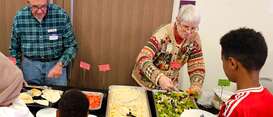Before stepping into IRC as an intern, I was accustomed to viewing engineers, lawyers, doctors, nurses, and politicians as difference-makers. I never quite understood the impact IRC had on me when I was resettled by them. At a young age, I learned that helping people was the right thing to do because that is what humanity is about. It never crossed my mind the extent to which IRC helps their clients gain a sense of independence, belonging, and self-actualization. Prior to families’ and individuals’ resettlement, many asylees and refugees depend so much on UNICEF and UNHCR for assistance in education, health, and protection. Refugees and asylees become extremely dependent on these organizations and doubt their ability to keep themselves from being taken advantage of. However, IRC teaches its clients autonomy and self-reliance. Rather than relying on IRC for job search, SNAP benefit, and Green Card application, IRC offers resources in which the clients acquire the knowledge to be able to assist themselves in the future. For example, when in need of health insurance, rather than filling the application for the clients, IRC ensures that the clients understand and complete the application so that when reapplying, the clients will be able to confidently help themselves. This to me, shows that IRC values humanity. IRC believes in the restoration of broken lives.

My family is an example of people who were given a second chance to rebuild our lives anew. We went from becoming refugees to becoming American citizens with the help of IRC. As an intern, I had the privilege of learning what it is like to help refugees. For example, I enjoyed providing one-on-one college guidance to high school students from various backgrounds. I explained what college application consists of FAFSA, the Common App, finding the right college, and Apply Texas. Along with that, I also worked with the UT Southwestern Medical Center for their research on the adaptation of refugee youth to their new home. This was very important to me because, as a refugee in the past, my English was not perfect, and college application processes and American culture were foreign. Working with the high school students, helping them learn English, and informing them about the college application process, was beneficial to me as well as to them. I was able to apply what I learned and help ensure that my mistakes as a new-comer weren’t theirs. I could empathize with them, and they saw that I was once in their shoes.

My goal, while speaking with the students, was to serve as an example. I tried to show them that I could relate to them. With the help of IRC and other programs, I was able to learn what American culture is like and, most importantly, seek my education without financial barriers. If I succeeded in these areas, they can as well. It is a matter of time, confidence, and hard work.
With that, I came to comprehend how I should conduct myself as an Academic Coach based on my observations as a student. The same patience, encouragement, hard work, and consistency that IRC workers provided for me when I was in my student’s shoes is what I needed to provide for my students. People like me and IRC staff are putting time and effort into making a difference in refugees and asylum seekers’ lives. Whether we can speak their language or not, we go out of our way to help our clients meet their needs without depriving them of their humanity.
Josephine Kalondji and her family were resettled from Mozambique by the IRC in Dallas in 2013. She is currently in her sophmore year at the College of the Holy Cross in Worcester, Massachusetts and is interning with Children's Hospital in Dallas. She is continuing to help the IRC as a consultant with our partner, UTSW, on a research project focusing on the psychosocial health of refugee youth from sub-Saharan Africa. The Mennonite Central Committee supported Josephine in her time at the IRC the summer of 2020. You can read other articles about or by Josephine here and here.
